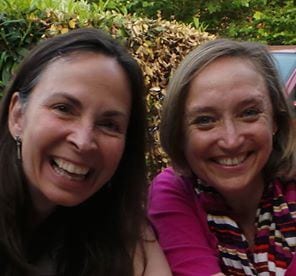In 2014, composer Amanda Jacobs and scholar Elizabeth (Beth) Dolan met at Chawton House in Hampshire, England, the former estate of Jane Austen’s brother. Amanda was JASNA’s first artist-in-residence in their International Visitor Program; and Beth was a Chawton House Library Fellow. At the end of their fellowships, they decided to collaborate to set Beachy Head, Charlotte Smith’s most challenging poem, to music.
After returning to the U.S. in the fall of 2014, they met weekly over Skype to read aloud and discuss Smith’s complex, 731-line, mostly blank verse poem. Gradually they began to see that the poem organized itself thematically into individual songs, and those songs into cycles. Beth began to edit the poem and through collaborative discussion, together they shaped the lyrics from Smith’s words. They decided not to add, but only to take away Smith’s words and to use music to convey the meaning of the words removed.
With the first draft of the lyrics ready, Amanda began composing. Like most creative endeavors, the process was not linear; rather, particular songs would call out to Amanda. The first song she composed was “Afternoon.” As Amanda listened to Beth read this section of the poem, Amanda heard the lazy, uneven sound of the water lapping through Smith’s words and placed this in accompaniment as the poem’s lines found melody. Later on, as she began to compose “Evening,” Amanda realized that “Afternoon” was only half complete as themes from “Afternoon” were occurring in the words set aside for “Evening.” Discussing this with Beth, they refined the lyrics, and made a scholarly discovery of the theme of nature vs. industry in this song cycle. Their collaborative and recursive process led to both musical and academic discoveries.
